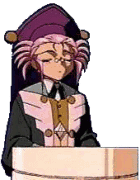![]()

How we review: Part II
Not satisfied with our short summary of how our reviews are done? Well, here's a blow-by-blow description of what we look for in the various titles that we review. After reading this, you could start your own review site.
![]()
- copyright info
- director
- screenplay
- production info
- length
- format (VHS/LD/CD/DVD, sub/dub/original)
- MPAA rating if available
![]()
Include enough information to provide background and episode set-up, as well as any key points that may occur. We try not to make spoilers out of the synopsis but in many cases, this cannot be helped.
![]()
Your opinion of the show, usually broken into the following:
Technical:
Include animation quality, soundtrack, story, casting, general production
Artistic:Include screenplay, plot devices, direction, voice acting
It's very important to give reasons for your opinion; that gives the reader a reference point to work with. Key point which occur in the show and interpretations (such as symbolic references, historic references, etc.) are a good idea to throw in. Any culture-specific items are good to include as well. Some items may be held back if they make good trivia questions.
![]()
Done on a very subjective 5-point scale in the following categories ( 0 being lowest, 5 being highest):
-
Story:
Is there one? Is it logical? Is it interesting? If based on historical events, is it accurate, or does the screenplay provide an interesting or original slant to the story?
-
Direction:
Does the show have flow? Does it take advantage of the tools and talents available? Use of innovative ideas and techniques to give new life to old ideas?
-
Acting:
Does the voice fit the character? Does the seiyu convey the scene effectively? Are you able to relate to, or believe that the character is real? If a comedy, does the seiyu have a good sense of timing and delivery?
-
Animation:
Is the cel work smooth? How detailed? Effective use of colour, depth of field, panning, framing, etc. (composition)
-
Music:
How well is the score written? Does it fit the mood and scene? Is it appropriate? How well is it played? Is the score merely a single phrase played over and over again with scale / harmonic variations, or is it rich and complex? Are levels set correctly relative to SFX and vocal track?
-
Translation:
How accurate? How appropriate? Does the translator re-write parts to take advantage of the scene, or is it re-written for either cheap humour or convenience?
-
Overall rating:
Very subjective score for the entire package; may not necessarily be an average of the previous scores, but of the show as an overall package.
TV shows, OAV's and movies are ranked differently. We use a sliding scale based on what we feel is appropriate for each of the media. For example, we would expect a far better technical production for a theatrical release over a weekly TV serial. In the music section, we also pay attention to the musician's skills. For example, there's a very good indication that the score for Macross Plus was done in a single take -- one of the trumpeters goes way off tune during the 'Macross Anthem'. With all the sound effects going on, it's not really audible during the OAV. Makes for a good sentence or two of discussion. Sometime, a story will seem to undergo a major change in the middle of a series. (Maison Ikkoku, for example, changed character designers in the middle, Several series have different writers, each with their own style. -- e.g., KOR during the final season.)
[ home ]
[ what's new ]
[ café contest ]
[ café reviews ]
[ parent's guide ]
[ encyclopædia ]
[ café trivia ]
[ café latté ]
[ café espresso ]
[ about the café ]
[ feedback ]
[ links ]
[ site map ]
© 1997-2000. All rights reserved. The Animé Café logo and the Crystal Kyoko award are original creations of the Animé Café. Please do not use any of the materials on this site without the expressed written permission of the Animé Café.
Page last modified 1999.11.01
